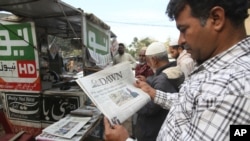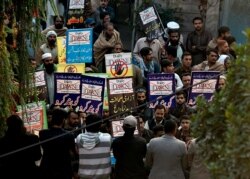A plan by Pakistan to streamline its media regulation bodies into one organization with expanded powers has raised concern among some journalists and analysts.
The country currently has more than a dozen separate agencies, but under a proposal first detailed in May, those bodies would be combined into one organization: the Pakistan Media Development Authority, or PMDA.
The body, appointed by Pakistani authorities, would oversee broadcast, print and digital media; establish new boards to investigate complaints; and grant licenses. As part of the changes, authorities would abolish or reform current media laws to align with the new regulator.
The proposal says the PMDA will remedy the current "fragmented" and "fractured" media regulatory environment, according to a copy of the PMDA concept paper shared with VOA.
But several journalists and rights groups, and some politicians, have warned the proposal would severely limit an already repressive media landscape, especially online, and raised concerns over how much power the PMDA could wield.
Control over media laws — including the wording on prohibiting media deemed "against the ideology of Pakistan" or that "endangers national security" — as well as a new tribunal system would give the body far-reaching powers, the journalists said.
Criticism of authorities is already deemed a red line. Authorities in the city of Lahore briefly detained two journalists on Saturday who were accused of posting "scandalous content" online. A minister had filed a complaint against Amir Mir and Imran Shafqat over a YouTube roundtable in which the journalists discussed the army's role in government, the Associated Press reported.
The Ministry of Information and Broadcasting did not respond to VOA's email request for comment. The country's Washington embassy also did not reply to emails requesting comment.
Michael Kugelman, deputy director of the Asia program at the Washington-based Wilson Center, said that the current media regulatory environment, like many Pakistani agencies, is mired in bureaucracy. But he doesn't think the PMDA is the answer.
The government "wants to essentially institutionalize its ability to control narratives in the media," Kugelman said. He added that concern about the rise of unregulated social media use, as well as the civilian government's deference to the military, may explain what prompted the proposal.
Harris Khalique, secretary-general of the Human Rights Commission of Pakistan, also thinks the proposed body would not be as productive as the government claims.
"I don't think that the current regulatory environment has as many issues as the government is pointing out," he told VOA. The PMDA "will be difficult to manage in the first place, so you're creating a sloppy, oversized institution to replace smaller, more efficient outputs."
Under the proposal, the PDMA would create a media tribunal process, overseen by a president-appointed chair of high court-judge level and made up of nine other government appointees with backgrounds in law, media, human rights and cybersecurity.
The tribunal would be able to sentence journalists to up to three years in prison and issue hefty fines.
The proposed system troubles prominent Pakistani journalist Hamid Mir.
"If there is no free media in Pakistan, there is no free judiciary in Pakistan," Mir told VOA. His brother Amir was one of the journalists detained Saturday.
"This is not 'Pakistan Media Development Authority' bill. This is 'Pakistan Media Destruction Authority' bill," Mir said. "This PMDA will actually impose a media martial law — or the total control of the government over the media industry — in Pakistan."
Throughout his decades-long career, Mir has faced retaliation for criticizing the government and the military and has survived two attempts on his life. In May, Geo News TV stopped broadcasting his popular political show Capital Talk.
The Jang/Geo Group, which owns Geo News, said the show would be suspended while the station looks into complaints about remarks Mir made against the military at a rally.
Mir had been speaking at a May event in support of Asad Ali Toor, a journalist who had alleged that intelligence officials assaulted him. Pakistan's Inter-Services Intelligence, the country's spy agency, denies the allegation.
This is the third time Mir has been banned in Pakistan. He is also facing sedition charges related to the remarks he made in May.
"It was very clear to me who was behind this move, because most of the petitioners, they are the proxies of the military establishment," Mir told VOA. "It was very clear to me that management of the TV channel was under the pressure of some very powerful people."
Geo News did not respond to VOA's email requesting comment.
Under pressure
Although Pakistan has a historically boisterous press, the country's critical journalists are at risk of arrest, kidnapping or threats, rights groups say.
"When you have been seeing a decade-long effort to increasingly control the [media] space, to see it culminate in something like the PDMA is not a surprising development," said Huma Yusuf, a columnist for Dawn, one of Pakistan's oldest and largest newspapers.
Others said that the reforms could further result in the country's laws being used against critical coverage of the military or blasphemy cases.
"The two red lines that you see in Pakistan are obviously anything to do with religion and any criticism of the military establishment," journalist Amber Rahim Shamsi told VOA. "They've always been there, by the way. But what has happened is talking about these two broad areas has been increasingly constricted."
While she was working for the Karachi-based broadcaster Samaa TV in 2018, Shamsi said, the Pakistan Electronic Media Regulatory Authority (PEMRA) requested that she not report on the acquittal of a woman sentenced to death for blasphemy. The journalist complied with the request.
Shamsi, who resigned from Samaa TV last year, says she believes the outlet was pressured to end her show.
Neither PEMRA nor Samaa TV responded to VOA's email requesting comment.
Other journalists told VOA the media largely self-censor to avoid coverage related to blasphemy and religion altogether.
"Even when someone is not working on content that is explicitly religious or in any way related to religious sensitivities etc., journalists are still threatened with charges under the blasphemy law," which fosters a "silencing environment," Yusuf told VOA.
For now, the government is consulting with stakeholders on the proposal. But some journalists believe that process is only for show.
"The consultations are happening so that they can say that, yes, there was a consultation. But whether they are serious about taking any of the consultations, or whether they are in any way serious about having some amendments and protecting freedom of expression? Absolutely not," said Munizae Jahangir, who hosts the current affairs program Spot Light for Pakistani news channel Aaj TV. The PMDA "would kill complete freedom of expression in Pakistan."
Pakistani media groups, including the Pakistan Broadcasters Association, the Council of Pakistan Newspaper Editors, and the All Pakistan Newspapers Society, rejected the PMDA at a meeting with the government this month.
The All Pakistan Newspapers Society had earlier told the Ministry of Information and Broadcasting that it rejects the PDMA, saying that it "smacks of an authoritarian streak that should have no place in democratically elected dispensation."
Still, many of those who spoke with VOA say they believe the PMDA will be established in coming months, likely through a presidential ordinance that Parliament will later extend or pass into law.







